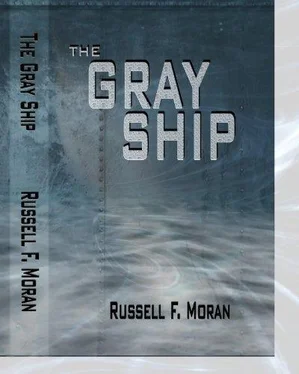“I shall see to that at once, General Lee.”
So the North has a secret weapon, thought Lee.
After his 45-minute morning workout, Jack Thurber holed himself up in the ship’s library with his laptop and portable hard drive. Like most writers, he was a pack rat. Technology makes it easy to be a packrat, and even encourages it. His portable hard drive holds two terabytes of data and set him back less than a hundred bucks. All of the research for every book he wrote is on that hard drive, with a backup on his office computer back home. His good friend, a techie, poked fun at Jack about his habit of carrying all his data on a portable drive.
“The cloud,” his friend said “is the only way to go.” All of his information could be carried on some remote server farm, backed up by dedicated computer dweebs.
Jack pondered that, on April 10, 2013 (or was it 1861?), the cloud disappeared. He patted his portable hard drive.
On orders from Captain Patterson he was reviewing all of the information he ever jotted down about time travel, specifically information on how to go back to the time you travelled from. In other words, how to get back to the wormhole.
Jack enjoyed himself. Work, whether mental or physical is what drives him. It’s his life, a life that he had considered ending a few short years ago.
Jack’s personnel file mentions that his wife Nancy had died in a car accident. What the file doesn’t say is that Jack witnessed the accident. Nor does it mention how much he loved her, cherished his every moment with her, and hated to be away from her. Nancy had taken her car to run an errand a half hour before Jack left the house to drive to a book interview. As he drove down the highway his eyes caught something in the air in front of him. In the opposite lane of travel, approximately 300 feet ahead, he saw a silver Lexus sedan, twisting and spinning crazily in the air. The car struck pavement and became airborne again, propelled by its momentum. After three bounces it came to a rest on its roof. He had one thought. It was more than a thought, more like a vice that gripped every square inch of his body and squeezed.
That looks like Nancy’s car.
The traffic came to a standstill. He flung open his door and ran to the scene of the wreck. He ran with abandon, not watching what was in front of his feet. He tripped over some debris on the shoulder of the road, pitching him forward. He broke his fall with his forearms. When he lifted his face and looked forward, he saw what would consume his life for years. Yes, it was Nancy’s car. And there was Nancy, lying in the roadway, her body in two pieces.
That scene became the focus of his every waking hour. What he had seen was unthinkable. God how he hated that word. If any manuscript came across his editorial desk he would take it out with a vicious stroke of his red pencil. Unthinkable. How do you unthink an image, an image as stark as any that the human eye can behold. Yes, the image of Nancy’s torn body was unthinkable, but how could he stop thinking about it endlessly. He not only contemplated suicide, he started to jot down plans for how he would do it. He considered finding the wormhole at Pearl Harbor and launching himself into war, an easy way to get killed.
His friend and book collaborator, the psychiatrist Benny Weinberg, took Jack on as if he were his most important case, because he was. As a psychiatrist for the New York City Police Department, Benny was no stranger to traumatic depression. Jack, normally an outgoing man at ease in any company, had become withdrawn and sullen.
Benny Weinberg and Jack had become close friends over the years. After Nancy’s death Benny tried to reach out to him, but his efforts got nowhere. Jack didn’t return phone calls. One day, after finally reaching him, Benny invited Jack over for lunch.
“Talk to me, Jack. You look like shit. What’s going on?”
“The image Ben. That image of Nancy has become my life. I’ve tried everything to get it out of my face, but it’s always there. Always. It’s there right now as we’re sitting here.”
“Asshole.”
Jack couldn’t help laughing. Benny could go from psychiatrist to tough cop in an instant.
“It may be true, Benny, but why do you call me an asshole?”
“You’re an asshole because you think your brilliant mind can reverse everything we know about the human brain. You think you can take a horrible image and force it out of your mind. Remember the old parlor game where the game master would tell everybody not to think about green elephants. Of course that’s the point of the game, the joke. The people playing the game couldn’t think about anything but green elephants. The psychology is simple. The more we resist something the more it persists. Okay, so let me ask you a question. What are you thinking about right now.”
“Green elephants.”
“That’s because you were trying not to think about it, just like you try not to think about Nancy’s torn lifeless body. Jack, work with me on something. I want you to close your eyes and imagine yourself sitting in your car right after you saw Nancy’s car crash to a stop.”
“Benny, are you trying to fuck with my brain?”
“You’ve been doing a great job of fucking with your own brain, so how about giving me a crack at it. Okay, now I want you to reach into your glove compartment and take out a tape measure. Now I want you to open the door and walk slowly, don’t run, walk slowly toward Nancy’s body. Be careful, the road is slick with blood, gas, and oil. Now I want you to take the tape and measure the exact distance between Nancy’s upper torso and her lower body.”
“Ben, you’ve got to be joking.”
“What the fuck do I look like, a standup comedian? Just follow my instructions. Now tell me exactly how far Nancy’s upper torso is from her lower body.” Jack said nothing.
“This isn’t rocket science, shithead, what’s the distance?”
“Six feet.”
“Exactly six feet?”
“Well, six feet, four and a half inches.”
Jack began to sob. “I’m sorry Benny, I’m sorry.” He kept on sobbing.
Benny waited for the tears to stop. “Only an asshole like you could apologize for acting like a human being.” Benny softened his voice and looked into Jack’s eyes. “Jack, when I heard about Nancy’s death and how you actually witnessed it, you know what I did? I cried. I cried like a baby. I cried for that beautiful woman who’s young life was snuffed out, but mainly I cried for my friend. That would be you, Jack. You’ve experienced a trauma like few other human beings will ever face. But you’ve been handling it by trying to force it out of your mind. That won’t work, Jack. That’s a green fucking elephant. That’s what the tape measure is all about. I want you to intentionally recreate that scene and allow it into your head. I want you to smell the smells, remember the sounds, listen to the sirens, hear the cops shouting. If you want me to be with you or on the phone when you do this, just let me know. That’s the only way you’re going to rob it of its power over you.”
Now, five years after he lost Nancy, Jack was emerging from his cave of despair, thanks in no small part to his friend Benny. He seldom thought of women, only a woman, Nancy. But he recognized that he was having a strange feeling, not an unpleasant one. Here, on a warship at sea in a strange time, he was becoming interested in a beautiful woman, his commanding officer. It was more than an interest, more like an infatuation. He liked the feeling.
Okay, thought Jack. Time to get back to work.
* * *
He began examining his two prior time journeys. Jack noted that, in his prior travels, one to the defunct golf course in 1929 and the other to Pearl Harbor in 1941, he was able to go back by finding the exact spot he came through. In the golf course trip, he walked in the opposite direction, but over the same spot. In the Pearl Harbor incident, he stepped on the same wooden plank in the same direction. These observations checked out with the other time travelers he had interviewed for his book. The key, obviously, is to find the spot, no matter how you cross it.
Читать дальше












